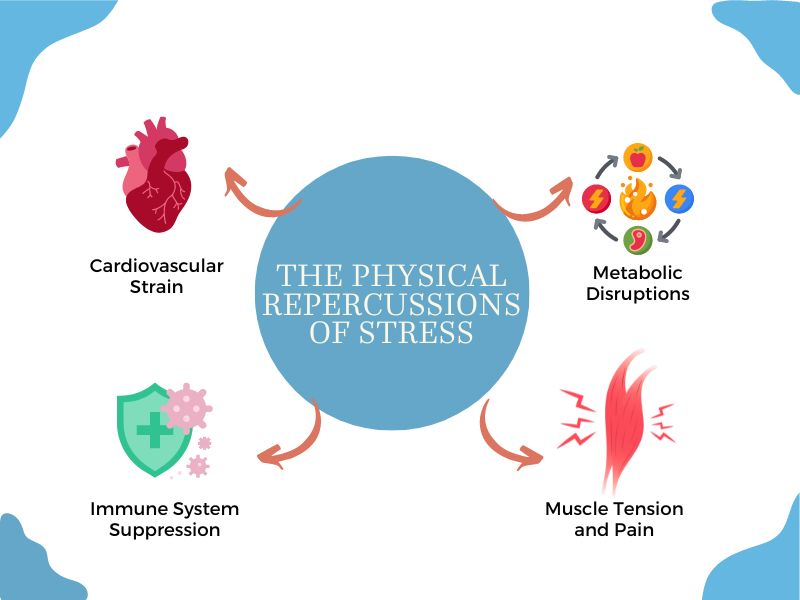Stress is an omnipresent force in our daily lives, intricately linked to both our environment and internal reactions. Here at MedPsych Integrated, we have witnessed firsthand the profound effects stress can have on individuals. Join us as we delve into the science of stress, highlighting its impact on the brain and body, and underscore the importance of professional help, particularly the role of online psychiatrists and the differences between psychiatrists and psychologists in managing stress.
Online psychiatrists are more accessible than ever, providing a crucial resource for stress management. They can prescribe medication and offer therapy, addressing both the psychological and physiological aspects of stress. This dual approach is essential for comprehensive stress management, underscoring the importance of choosing the right professional, whether it’s an online psychiatrist or understanding the difference between a psychiatrist and a psychologist.
Stress, in its most basic form, represents the body’s instinctual reaction to perceived dangers or threats, a phenomenon that triggers the well-known ‘fight or flight’ response. This complex biological reaction is characterized by the secretion of specific hormones, primarily adrenaline, and cortisol, which play pivotal roles in preparing the body to either confront the imminent threat directly or flee from it for safety. The surge of adrenaline boosts the body’s alertness and energy levels, enabling a rapid response to the situation at hand, while cortisol, often referred to as the stress hormone, helps to maintain fluid balance and blood pressure, among other vital functions.
The Crucial Role of the Brain in Stress Response
The brain, especially regions like the amygdala, hippocampus, and prefrontal cortex, is central to the stress response. The amygdala, in particular, sends alarm signals that prompt the hypothalamus to kick-start the stress response. This has profound implications not only for our emotional well-being but also for our cognitive abilities. Prolonged stress can bring about significant changes in the brain, heightening the risk of anxiety and depression.
Cognitive and Emotional Consequences of Stress
Stress can severely impair the prefrontal cortex, which is responsible for decision-making and impulse control, leading to challenges in concentration, decision-making, and memory. The constant state of alertness can also lead to emotional exhaustion, exacerbating irritability, anxiety, and mood swings. Moreover, long-term stress can modify the brain’s structure and functionality, reducing the size of the prefrontal cortex and enlarging the amygdala, thereby making the brain more susceptible to stress.
The Physical Repercussions of Stress

While the ‘fight or flight’ response is crucial for immediate survival situations, its activation over long periods due to chronic stress can lead to a range of detrimental physical effects:
- Cardiovascular Strain: Chronic stress can significantly tax the cardiovascular system, elevating the risk of developing heart disease, and hypertension, and increasing the likelihood of stroke due to the persistent increase in heart rate and blood pressure.
- Immune System Suppression: The body’s immune response is compromised under continuous stress, making it more susceptible to infections, slowing down the healing process, and potentially increasing the risk of more severe health conditions, including autoimmune disorders.
- Metabolic Disruptions: High levels of cortisol resulting from chronic stress can disrupt metabolic processes, leading to weight gain, obesity, and an increased risk of metabolic syndrome, type 2 diabetes, and other metabolic disorders.
- Muscle Tension and Pain: Persistent muscle tension as a result of chronic stress can lead to widespread body aches, including headaches, back pain, neck pain, and an increased risk of developing chronic musculoskeletal conditions.
Additional harmful consequences of chronic stress include:
- Digestive Issues: Stress can adversely affect the gastrointestinal system, leading to symptoms such as nausea, heartburn, acid reflux, and exacerbating conditions like irritable bowel syndrome (IBS) and inflammatory bowel disease (IBD).
- Respiratory Problems: Stress can exacerbate respiratory conditions, such as asthma and chronic obstructive pulmonary disease (COPD), making breathing difficulties more pronounced.
- Skin and Hair Problems: Chronic stress can manifest physically in the form of skin issues, such as acne, eczema, and psoriasis, and can contribute to hair loss or hair thinning.
- Reproductive Health Effects: In men, prolonged stress can lead to decreased testosterone levels, reduced sperm quality, and fertility issues. In women, it can cause irregular menstrual cycles, decreased libido, and complications during pregnancy.
- Sleep Disturbances: Chronic stress is a common culprit behind sleep problems, including difficulty falling asleep, staying asleep, or experiencing restorative sleep, leading to a cycle of fatigue and increased stress.
- Cognitive and Emotional Impact: Over time, stress can impair cognitive functions such as memory, concentration, and decision-making. It can also lead to emotional disturbances, including an increased risk of anxiety, depression, and other mental health disorders.
- Increased Aging Process: Chronic stress can accelerate the aging process, evidenced by telomere shortening in chromosomes, which can lead to premature aging of cells and increased susceptibility to age-related diseases.
Navigating Stress with Professional Help

Recognizing the impact of stress is crucial for its effective management. Among the various strategies, seeking professional help stands out. Online psychiatrists, who are now more accessible than ever, can provide valuable guidance and support for managing stress. It’s essential to understand the difference between a psychiatrist and a psychologist to ensure you receive the appropriate care. Psychiatrists, being medical doctors, can prescribe medication and offer therapy, making them a crucial resource, especially for those looking for a psychiatrist accepting new patients.
Incorporating healthy stress management practices and seeking professional help, particularly from online psychiatrists, can mitigate stress’s adverse effects. It’s crucial to approach stress management with patience and compassion, recognizing the strength in seeking help, such as from a psychiatrist accepting new patients.
Understanding the multifaceted nature of stress and its extensive impact on our lives is the first step toward effective management. By incorporating healthy stress management practices and seeking professional help when necessary, particularly from online psychiatrists or understanding the psychiatrist vs psychologist roles, we can mitigate the adverse effects of stress. It’s important to approach stress management with patience and compassion, both for ourselves and others, as we navigate through life’s challenges with resilience and grace. Remember, recognizing when to seek help, especially from a psychiatrist accepting new patients, is a sign of strength and a critical step toward maintaining our mental and physical health. Take advantage of the invaluable resources offered by institutions like the Mayo Clinic to support your journey towards better mental and physical health.
Don’t let stress dictate the quality of your life. Act now to embrace a healthier, more balanced life. Reach out to MedPsych Integrated today and take the first step towards a stress-free tomorrow. Your health is your most valuable asset; let’s protect and enhance it together.




